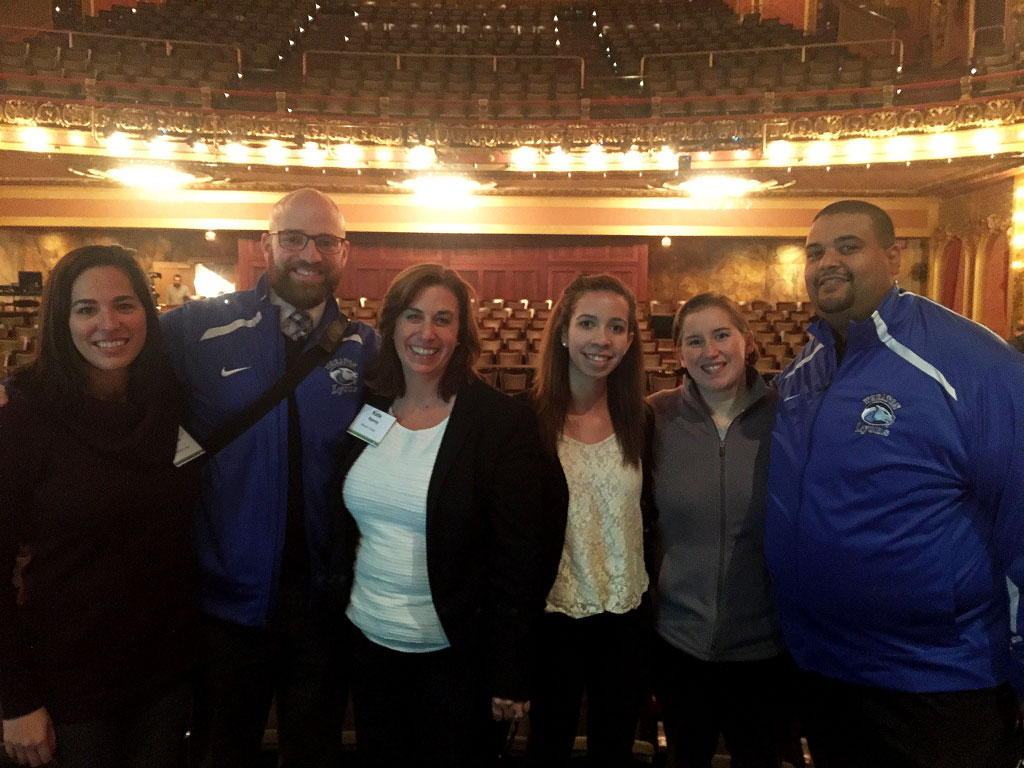Building a safe community

Wheaton received two grants this fall aimed at making the campus a safe, inclusive place for all genders—including a second three-year grant from the U.S. Department of Justice (DOJ) that will enable the community to expand its efforts to prevent sexual and gender-based violence.
The first grant, a $10,000 award from the Avon Foundation for Women, included an invitation for Wheaton representatives to attend the National Leadership Institute: Changing the Narrative on Campus Gender-Based Violence, a conference held in Boston in October.
“We were able to learn and revisit key concepts around the intersection of interpersonal violence and campus communities,” Courtney Ruggles, coordinator of Wheaton’s Sexual Misconduct and Assault Resource Team (SMART), said of the conference. “We were given time to work as a group to develop an action plan for our campus as well as to network with the nine other area schools there and share ideas, successes and questions.”
The second award is a $300,000 Campus Program Grant from the DOJ Office on Violence Against Women (OVW). A continuation grant, it will expand on work begun with the first OVW grant Wheaton received in 2012.
“Receiving this grant for the second time means that the Justice Department OVW has confidence in our ability to continue to grow and develop our programs and initiatives on campus,” said Kate Kenny, vice president for student affairs and dean of students. “It is a testament to the hard work, dedication and quality of what we have created thus far with grant funding.”
The continuation grant comes several months after Wheaton reached a settlement agreement with the Department of Justice on a Title IX investigation and compliance review of the college. The resolution of the year-long review required the college to revise policies and practices, including educational and training programs that it offers to faculty and staff.
The department commended the college for its work in responding to the review as well as its “work to foster a safe and healthy campus environment where all students can achieve their full potential. “
The first OVW grant enabled Wheaton to provide new programs around the prevention of sexual and gender-based misconduct, such as establishing an annual Consent Day, and to strengthen the college’s partnerships with the Norton Police Department and New Hope Inc., Kenny said.
One program introduces first-year students to the concept of bystander intervention during summer orientation.
“Bystander intervention is one of the most effective, evidence-based strategies for interpersonal violence prevention, and we are excited to have more resources dedicated to it to be able to expand the program,” Ruggles said. “We want to be able to extend that education and outreach more intentionally over the first six weeks of the semester to increase efficacy and awareness.”
The initial grant also supported academic programs—in particular, a theater class taught by Professor of English and Playwright-in-Residence Charlotte Meehan that opened up dialogue among students on sexual assault, sex on a college campus and related topics using improvisation and other techniques.
The work in that class led Meehan to write a script for a play titled What Happens When, which the Theatre and Dance Department produced in the spring of 2015. Thanks to numerous efforts to build campus interest, the play drew large audiences, and it has been made available to other institutions that are looking for new ways to address sexual violence.
“We also surveyed the audiences about how they experienced the play and its impact on their ideas around the topic of sexual assault,” said Associate Professor of Theatre Stephanie Daniels, who directed What Happens When. “We were able to do an intense group work process with our actors as well through a post-rehearsal and -production focus group.”
With the continuation of the OVW grant, Daniels will focus on sexual assault and prevention and bystander intervention in her “Theatre and Social Change” class offered this spring and during the 2018–19 academic year.
These grants also will support continued development of a student men’s group on campus focused on healthy masculinity and violence prevention, said Brandon White, associate dean of students and director of student conduct.
“The National Leadership Institute provided some really good information about trauma-informed approaches, best practices in prevention efforts and a good chance to measure ourselves with others at the institute,” White said.
